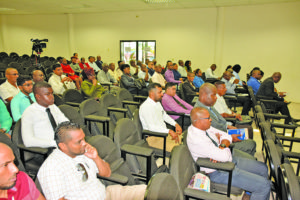A number of staff members from the State Asset Recovery Agency (SARA) and other agencies on Monday started an 18-day training programme with support from the Caribbean Institute of Forensic Accounting (CIFA) aimed at teaching participants the basic concepts of assets recovery and forensic auditing.

In declaring the workshop open, Head of SARA, Dr Clive Thomas told participants that corruption could not be tackled by one institution such as SARA, but it has to be multi-pronged. He said this was the main reason for including persons from other agencies that work closely with the finance, revenue and management sectors.
He told the attendees who were drawn from several State agencies that the exercise was mandated by law. “The law in its wisdom mandates me to treat training as a priority. I have to train you, not because I think training is necessary, but I am compelled by law to provide you with training, and that I will do.”
Professor Thomas told the participants that the training was systematic and they were required to be diligent, attentive and punctual. Further, he said that the training to be undertaken was critical if the agency was to succeed at the task of asset tracking and recovery.
“The law also gives me other powers, but those powers can only be exercised on the basis of the competence of those persons who are executing on SARA’s behalf or in the name of anti-corruption,” he explained, adding that he was also compelled by law to ensure that they were certified.
In delivering brief remarks at the opening, Guyana Revenue Authority (GRA) Commissioner Godfrey Statia noted that corruption accounted for 45 per cent of all frauds in Latin America and the Caribbean; therefore, Guyana was not alone.
However, he said Guyana should try to reduce fraud and gave the commitment of the GRA to work with all the agencies for the good of the country. He also emphasised the importance of networking among the various agencies involved in the fight against corruption and fraud.



